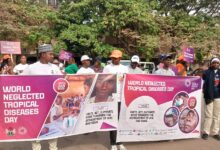‘90% Of Hepatitis Patients In Africa Lack Access To Treatment’

The World Health Organisation (WHO) has decried the inequity in the treatment and care of hepatitis patients on the African continent saying that, more than 90% of people living with hepatitis in the continent do not receive the care they need, and less than 10% of the population has access to testing and treatment.
WHO Regional Director for Africa, Dr. Matshidiso Moeti disclosed this on Friday, July 28, 2023, in her message commemorating this year’s World Hepatitis Day.
Moeti stated that, the theme for this year’s World Hepatitis Day, “One Life, One Liver” sought to emphasise the link between viral hepatitis infection and liver inflammation—that is, liver injury and damage—and the broader issues of liver health and primary health care.
She further said that “more than 91 million Africans are living with hepatitis. In 2019, an estimated 1.2 million new hepatitis infections and 125 000 hepatitis-related deaths occurred in the African Region. Deaths occur mostly among the young and productive segments of the population”.
Consequently, she informed that WHO’s global hepatitis strategy, endorsed by all WHO Member States, and the Framework for an Integrated Multisectoral Response to Tuberculosis, Human Immuno-deficiency Virus (HIV), Sexual Transmitted Infections (STIs), and Hepatitis in the WHO African Region aim to reduce new hepatitis infections by 90% and deaths by 65% by 2030.
She also informed that WHO supports regional and national efforts to eliminate viral hepatitis by 2030 by providing clear guidance for decentralized and simplified person-centered prevention, testing, and treatment of viral hepatitis, including eliminating hepatitis B through birth dose vaccination (the day of birth or the day after).
The Health Expert, however, admitted that a lot still needed to be done to reduce hepatitis-related deaths and infections:
“Despite the availability of diagnostic tools and effective treatment, more than 90% of people living with hepatitis in Africa do not receive the care they need, and less than 10% of the population has access to testing and treatment. This leads to progressive advanced liver disease, devastating financial burden, emotional distress, and stigma”.
According to Moeti, testing and treatment, as a public health approach, remained the most neglected aspect of the response:
“The highest burden of hepatitis B infection in children below 5 years of age is seen in countries without hepatitis B vaccination at birth. Immunization, thus, is an important component in the fight against hepatitis.
“I am glad all 47 Member States in the Africa Region have included the Hepatitis B vaccine in routine immunization. However, coverage for routine childhood vaccination against Hepatitis B in the region stands at 72%, far below the global target of 90%. As of 2022, 16 countries in the region provide a birth dose of the vaccine to all newborns, up from 11 in 2021. Let’s take advantage of available tools and interventions to ensure liver health for all persons”, she said.
The WHO Regional Director for Africa, further stated that there was a need to make services available through strong primary health care services increasingly funded through domestic resources.
Also, testing and treatment interventions must be made part of the essential package of health services delivered through integrated primary health care that addresses the needs of individuals of all ages (newborn, child, adolescent reproductive, and maternal health care).
Additionally, hepatitis B immunisation coverage must be scaled up to reach the globally agreed target of 90%.
She, therefore, urged all countries to work to introduce the Hepatitis birth dose and also encouraged policymakers and partners to demonstrate political commitment to sustained and simplified hepatitis testing, prevention, and treatment as part of broader liver health and primary health care to achieve viral hepatitis elimination.
“I remind communities to take up hepatitis vaccination, hepatitis testing, treatment, and curative services through all available health services.
“I commend Namibia for being the first country to apply for the WHO path to Mother To Child Transmission Triple elimination status, including Hepatitis B, and look forward to other countries in the region doing the same soon”, she said.






